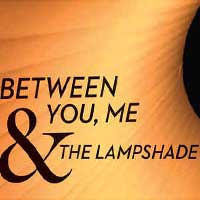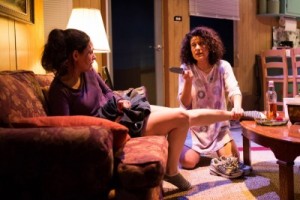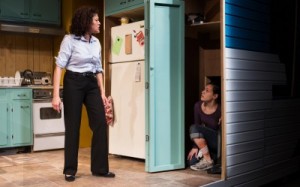
There is something discordant about what should be the sophisticated technical aspects of “Between, You, Me, and the Lampshade.” While the set by (Jose Manuel Diaz) is detailed and convincing as a suburban Texan home, Raúl Castillo’s script makes it clear that it is not suburban, that it is in the country, and implies that it is a trailer home rather than a comfortable ranch house—the ambience which Diaz’s set produces. Similarly, the lighting (Erik S. Barry) produces some astounding affects in both the video game and nightmare sequences, but never gives the sense of the intense desert sun or light of Texas. Except for some sound design (Victoria Delorio), we never really get the sense that we are in a border-town; in fact, a window looks out into pitch-black nothing ever in scenes set during daytime.
These disparities are matched by a plot that can be likewise incongruous. Castillo’s script begins with a strong and interesting premise. Victoria (Ayssette Muñoz) is an undocumented immigrant, newly arrived in the United States, whose older husband has just been murdered, presumably by a xenophobic vigilante. She stumbles into a house, and seeks shelter from Jesse (Sandra Marquez), a second generation Mexican-American woman who has deliberately cut herself off from her ethnic roots—she doesn’t even speak Spanish. Jesse reluctantly hides her while being romantically pursued by a border patrol agent, Max (Jim Farruggio), who helped ensure that her teenage son Woody (Tommy-Rivera-Vega) never received more than probation for assault. Meanwhile, Woody entertains a dynamic teenage girl called Kristen (Bryce Gangel) who has dropped everything and flown from Los Angeles to Rural Texas with some LSD after chatting to Woody on a videogame.
This should be a formula for constant tension, high drama, and ultimate disaster, and indeed for most of the play, that is where the characters choices seem to be leading. However, director Ricardo Gutierrez doesn’t isn’t able to capitalize of his actors strong performances or block the show in a way that emphasizes the undesirable and terrifying situation that Jesse and Victoria are in, nor is he able to build an appropriate level of suspense, but perhaps Castillo’s ending left him a bit disorientated. Lose ends are not tied up, and a situation that should end in disaster is not only cursorily resolved, but done so in an underwhelming way. Moreover, behavioral changes in characters that are extremely sudden, and never explained or explored during the play, occur during, and become central to, its apparent resolution.
That said, Castillo’s script certainly manages to explore interesting themes. Jesse and Victoria have very little trouble communicating despite the fact they don’t speak a common language, bringing into doubt just how possible it is for Jesse to eschew her parents identity for a completely American one. Affecting dream sequences between Victoria and her murdered, and decomposing, husband Meme (Steve Casillas) in which she can speak English emphasize her enduring hope even in the midst of the terrible nightmare that she is living while effectively utilizing current political discourse about “the dreamers.”
Sandra Marquez and Aysette Muñoz both give incredible strong performances as Jesse and Victoria respectively. Marquez’s exudes a concern for others: her son, her clients, and Victoria, appropriate to a mother and social worker while giving the sense of someone who has deliberately cut herself off from the provenance of her life. As to Muñoz’s Victoria, while some-theatregoers may find her portrayal to be stereotypically weak and deferential, I thought that she not only that she executed the part with perfect verisimilitude, but also find it very believable that an illegal teenage immigrant, who speaks no English, just swam across the river to America, recently saw her husband murdered, and had a gun pointed at her would behave with the hyper-vulnerability in a strange Americans home which Muñoz so effectively conveys. In fact, if there was a character whose humanity was downed-played down it was Max, but the authoritarian, church-going, Texan is so familiar in media, and even self-cultivated by politicians that Farragio’s came off as more convincing than caricatured and was certainly faithful to Castillo’s script.
Teatro-Vista is presenting Raûl Castillo’s “Between, You, Me, and the Lampshade” at The Richard Christiansen Theatre at the Victory Gardens Biograph Theatre located at 2433 N. Lincoln Avenue through May 10th. Performances are Thursday Through Saturday at 7:30 pm and Sunday at 3:00 pm with an additional Matinee performance at 3 pm on May 9th. Tickets for weeknight and matinee performances are $25 and Saturday night performances are $30. Half-price student rush tickets are available 30 minutes before each performance with an ID. Discounted tickets are also available for groups of 10 or more and seniors (over 65) with an ID.To purchase tickets call 773-871-3000 or online visit www.teatrovista.org
105 minutes, no intermission
To see what others are saying, visit www.theatreinchicago.com, go to Review Round-up and click at “Between You, Me and the Lampshade”







More Stories
“Dummy in Diaspora”
“The Magic School Bus: Lost in the Solar System”
“February House” reviewed by Julia W. Rath